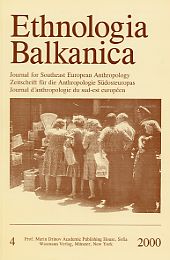Zeitrhythmen und Umgang mit Zeit im Arbeitsalltag des sozialistischen Dorfes. Das Beispiel eines Gebirgsdorfes in Bulgarien
Time Rhythms and Use of Time in Everyday Work in a Socialist Village. The Example of a Mountain Village in Bulgaria
Author(s): Doroteya DobrevaSubject(s): Customs / Folklore
Published by: LIT Verlag
Keywords: socialism in Bulgaria (1950-1989);
Summary/Abstract: The article deals with the two basic categories “work” and “time” and their interrelation as an integral part of the everyday life in a Bulgarian village in the socialist period. “Working time” is used here as a term comprising different kinds of work, i.e., the official and paid-for working time at the work place and the time spent on work outside the work place. In order to elucidate the question of how the socialist transformation of the village changed the work rhythm of the people (since 1950) and what value orientations concerning the use of time eventually prevailed in the everyday life and work of the socialist villagers, I analyse a few structures of working time in the daily and yearly cycle. In addition, the attitude of the workers towards their work and their working time in the “socialist” and in the “private” sector is described, focusing on the main job and on secondary jobs. The examples cover all relevant time periods (1950–1989) and all relevant economic sectors (agriculture, forestry, small industries, crafts, services, and the private household economy). The sources (archival materials and interviews) present ample evidence that the inhabitants of the investigated village adopted, only partially, regular structures for their working time. Instead, one can discern a permanent flow of working time between the official work place and other sectors; fluctuations between the main job and secondary jobs, between paid and unpaid work, between voluntary and obligatory or even forced work, between work and leisure time. The working time in socialist everyday life can be best described as fluid time, with overlaps both between the various sectors and between the various time structures and work rhythms. The incompatibility of the various temporal rhythms resulted in permanent rearrangements of working time and above all in numerous conflicts. Contrary to the explicit goals of the Communist Party, the “socialist transformation” of the village never really changed the cyclical structure of work rhythms and never led the villagers to the rational and disciplined use of time or to the linear concept of time which are prerequisites for modern industrialised societies.
Journal: Ethnologia Balkanica
- Issue Year: 2000
- Issue No: 04
- Page Range: 67-89
- Page Count: 23
- Language: English
- Content File-PDF

